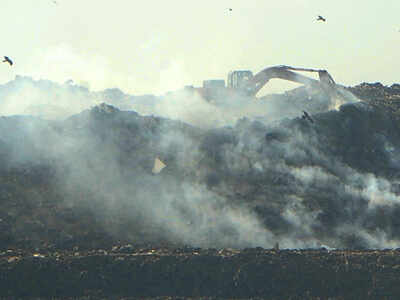
KOLKATA: The city police has decided to ban waste burning within the city limits from July 3 to August 31. Kolkata Police was the first state agency to respond to the unprecedented pollution in Kolkata last winter and imposed a ban on waste burning from January 1, 2019 to February 27. Under a recent NGT order, police can slap a fine of Rs 5,000 to Rs 25,000 for violations, claimed sources.
Among the items that cannot be burned are refused derived fuel (RDF), which includes plastic, wood, tyre, pulp or organic waste, garbage and biomass. Among other items that can’t be burned are hazardous waste like discarded paint drums, pesticide cans, CFL bulbs, tube lights, expired medicine, broken mercury thermometers, used batteries, used needles and syringes and contaminated gauge. Dry waste like inert street sweepings, combustible waste, sanitary napkins and diapers also feature on the ban list.
Apart from vehicular fumes, waste burning is one of the biggest sources of air pollution in Kolkata. The sharp rise in particulate matter (PM) in the air has led to a spike in respiratory distress and other long-term physical ailments among citizens. Kolkata’s air takes a turn for the worse in November, which continues till the end of February. This year, it has been the worst in recent memory with air quality degradation beginning with bursting of crackers during Kali Puja-Diwali. It remained consistently poor throughout November and eased only in the middle of December after a spell of rain brought down the PM count.
With the pollution level exceeding that of Delhi on certain days, activists have been calling for action from the state. The clamour for action gathered strength after doctors expressed extreme unease over the high pollution level and warned that it could lead to long-term health problems.
Though the environment department and West Bengal Pollution Control Board have been conspicuously silent on the issue, the city police’s move to ban waste burning in its jurisdiction has raised hope.
A study by the National Environment Engineering and Research Institute (NEERI) has indicated that waste burning might be the biggest source of pollution along with automobile exhaust. The NGT had on December 23, 2016, imposed a ban on burning of waste in open places and announced a fine of Rs 25,000 on each incident of bulk waste burning. Waste burning was prohibited even on landfills. “For each such incident, violators, including the project proponent, concessionaire, any person or body responsible for such burning, shall be liable to pay environmental compensation of Rs 5,000 in case of simple burning and Rs 25,000 in case of bulk waste burning,” a bench headed by NGT chairperson Justice Swatanter Kumar had ordered.
Among the items that cannot be burned are refused derived fuel (RDF), which includes plastic, wood, tyre, pulp or organic waste, garbage and biomass. Among other items that can’t be burned are hazardous waste like discarded paint drums, pesticide cans, CFL bulbs, tube lights, expired medicine, broken mercury thermometers, used batteries, used needles and syringes and contaminated gauge. Dry waste like inert street sweepings, combustible waste, sanitary napkins and diapers also feature on the ban list.
Apart from vehicular fumes, waste burning is one of the biggest sources of air pollution in Kolkata. The sharp rise in particulate matter (PM) in the air has led to a spike in respiratory distress and other long-term physical ailments among citizens. Kolkata’s air takes a turn for the worse in November, which continues till the end of February. This year, it has been the worst in recent memory with air quality degradation beginning with bursting of crackers during Kali Puja-Diwali. It remained consistently poor throughout November and eased only in the middle of December after a spell of rain brought down the PM count.
With the pollution level exceeding that of Delhi on certain days, activists have been calling for action from the state. The clamour for action gathered strength after doctors expressed extreme unease over the high pollution level and warned that it could lead to long-term health problems.
Though the environment department and West Bengal Pollution Control Board have been conspicuously silent on the issue, the city police’s move to ban waste burning in its jurisdiction has raised hope.
A study by the National Environment Engineering and Research Institute (NEERI) has indicated that waste burning might be the biggest source of pollution along with automobile exhaust. The NGT had on December 23, 2016, imposed a ban on burning of waste in open places and announced a fine of Rs 25,000 on each incident of bulk waste burning. Waste burning was prohibited even on landfills. “For each such incident, violators, including the project proponent, concessionaire, any person or body responsible for such burning, shall be liable to pay environmental compensation of Rs 5,000 in case of simple burning and Rs 25,000 in case of bulk waste burning,” a bench headed by NGT chairperson Justice Swatanter Kumar had ordered.
World Cup 2019
Trending Topics
LATEST VIDEOS
City
 Kolkata's Muslim majority Khidirpur area celebrates Rath Yatra with great fervour
Kolkata's Muslim majority Khidirpur area celebrates Rath Yatra with great fervour  Mentally challenged woman mercilessly thrashed by locals in Karnataka's Shimoga
Mentally challenged woman mercilessly thrashed by locals in Karnataka's Shimoga  Congress MLA Nitesh Rane instigates mob to throw mud water on engineer, tie him up as 'punishment' for bad roads
Congress MLA Nitesh Rane instigates mob to throw mud water on engineer, tie him up as 'punishment' for bad roads  On cam: Goons threatening residents in Bengaluru
On cam: Goons threatening residents in Bengaluru
More from TOI
Navbharat Times
Featured Today in Travel
Quick Links
Lok Sabha Election Schedule 2019Lok Sabha Election NewsDelhi Capitals teamMI team 2019Rajasthan Royals 2019RCB team 2019Maharashtra Lok Sabha ConstituenciesBJP Candidate ListBJP List 2019 TamilnaduShiv Sena List 2019AP BJP List 2019Mamata BanerjeeBJP List 2019 MaharashtraPriyanka GandhiBJP List 2019 KarnatakaAMMK Candidate List 2019BJP List 2019 WBLok Sabha Elections in Tamil NaduBSP List 2019 UPNews in TamilLok Sabha Poll 2019Satta Matka 2018PM ModiMahagathbandhanNagpur BJP Candidate ListChandrababu NaiduTamil Nadu ElectionsUrmila MatondkarNews in TeluguMadras High CourtTejashwi YadavArvind KejriwalTejasvi SuryaPawan KalyanArvind KejriwalYogi AdityanathJaya PradaSatta King 2019Srinagar encounter
Get the app




